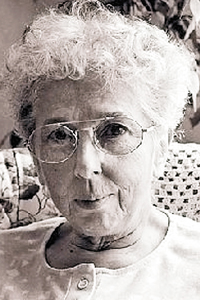February 28, 2006 7:38 PMHAVE DU WILL TRAVEL
‘It violates all traditional ideas of war.’An Interview With Dr. Rosalie BertellBy W. Leon SmithEDITOR-IN-CHIEF ICONOCLAST: I have some questions regarding DU and thought you might be willing to discuss it with me. DR. ROSALIE BERTELL: I am an environmental epidimiologist and have worked for more than 30 years on low-dose radiation. I do know a lot about DU. ICONOCLAST: I understand we are seeing a higher incidence of diabetes, cancer, and leukemia because of DU. Have you done any studies regarding that? BERTELL: Well, obviously, they’ve used so much of it and it’s an aerosol. An aerosol can float in the air a long time and can go great distances. So, that said, it’s probably pretty well spread at least in the northern hemisphere from both Gulf Wars, and also they used it in Kosovo and apparently in Afghanistan. A lot of it’s out there. But whether or not it’s connected with diabetes I can’t prove. ICONOCLAST: How does exposure affect the body? BERTELL: First of all, it’s an internal exposure, and the current studies on internal exposure are not very reliable, so people have been speculating on what might be a reasonable outcome. It certainly can upset the hormone system and that is one of the causes of diabetes. But there is no hard evidence that it really does this. It is logical and credible, but the government is so focused on cancer that it doesn’t ever study it. ICONOCLAST: Are you familiar with the report due out on March 1 regarding the travel of DU to the UK. BERTELL: Yes. ICONOCLAST: What are your thoughts on that? BERTELL: Well, it’s a well-done study and, you now, I always keep a little reservation because often we don’t have any idea what NATO or Aldermaston or the British military are doing, and so when you find DU in the air, you can assume it’s coming from the Gulf War, but it might be the military’s doing something that you don’t know. Actually Chris Busby who wrote this is a yatchsman and he did check all the weather and the wind and the back breeze that does come from Iraq and he did a pretty good study. It’s just that you always have an unknown factor because the military is not accountable to people. ICONOCLAST: Do you think the people in the UK need to be alarmed at the results of this study? BERTELL: Not just the people in the UK, but people all over. ICONOCLAST: All over the world? BERTELL: Yeah, at least the northern hemisphere. ICONOCLAST: Is there anything people can do to protect themselves from the radiation that you know of. BERTELL: I wish there was. About the only thing we know to do is drink distilled water to get heavy metals out of the body. That’s one thing. Another is replace the proteins which would be lost. You know, a heavy metal does two things. It forms a compound with the chemicals in the body to get rid of heavy metals and it also causes free radicals and the same enzyme that gets rid of a heavy metal is also the one that fights the free radicals. Because you have a heavy metal which is radioactive, if it tries to get rid of the heavy metal it’s not going to be there to fight the free radicals, so you are going to have some kind of problems internally with this. You can’t use the same enzyme for two purposes. ICONOCLAST: So we need to eat more protein? BERTELL: Proteins would help because it would replace the enzyme that you need. ICONOCLAST: As far as trying to put a stop to the use of depleted uranium, do you think the public should do that? BERTELL: I think it shouldn’t be used. It’s a gas, and we’ve already signed the Geneva protocol not to use gas in warfare. It’s already illegal. It’s a metal fume. A metal fume is a gas. ICONOCLAST: I see. BERTELL: I think a weapon like this is so indiscriminate, it’s going to be exposing civilians, women and children and the elderly. You know, it violates all traditional ideas of war. And it exposes people who are not fighting, whether it’s countries not fighting or civilians in the country where the war is. That is unacceptable. |
|
© 2006, The Lone Star Iconoclast

